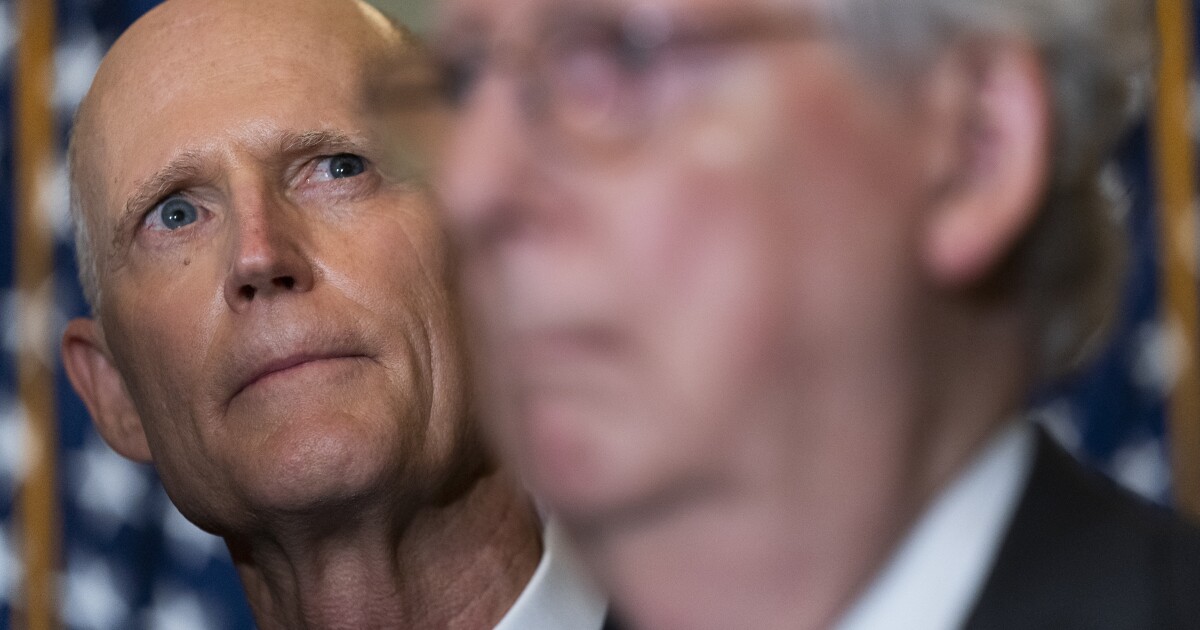

Sen. Rick Scott (R-FL) has managed some rare feats. He’s been accused by Senate GOP leadership of hurting the party’s chances in the midterm elections while at the same time presiding over a campaign fundraising haul for the party so large that leadership has no choice but to celebrate it.
He’s united Senate Minority Leader Mitch McConnell (R-KY) and President Joe Biden in opposition to his agenda.
And the former Florida governor and current chairman of the National Republican Senatorial Committee has worked to position himself as an outsider that would presumably accompany an ultimate insider.
SENATE REPUBLICANS DEMAND YELLEN PROVIDE TREASURY DOCUMENTS RELATED TO INFLATION
Scott’s precise plans for the future remain unclear. Some Republicans and analysts believe he is angling to become the Senate Republican leader after McConnell, while others think he is setting his sights even higher, looking ahead to 2024.
What is clear is that Scott has taken controversial steps in an effort to break through an increasingly crowded collection of rising GOP stars.
“I think it’s [a] jump ball in 2024,” Eric Fehrnstrom, GOP strategist and former senior aide to Sen. Mitt Romney’s (R-UT) 2012 presidential campaign, told the Washington Examiner. “It will be a crowded field, and nobody can claim an edge at this very early stage.”
Before winning Florida’s governorship in 2010, Scott was a healthcare executive. He’s now one of the Senate’s wealthier members and has often talked about his business background and how government should run similarly.
“What Rick Scott brings to the contest is a business background when the economy will probably remain a central issue, as well as the executive leadership experience that comes from being a former governor,” Fehrnstrom added. “That will be more important in the minds of voters than the time he has spent as senator, although his service as NRSC chair in this current cycle allows him to travel to early states, meet with important donors, and introduce himself to the activist base.”
But Scott’s economic prescription for those who earn very little is what placed him at odds with GOP leadership and Democrats alike earlier this year when he released an 11-point policy agenda that included, among other things, a proposal to increase the federal tax liability of people on the lower end of the income spectrum.
The “Plan to Rescue America” earned Scott public and private rebukes, some from Republicans who complained Scott had given Democrats something on which to run against the GOP in November.
“I hope they do,” Scott said defiantly at a Heritage Foundation event in late March, weeks after he penned an op-ed responding to criticism of his plan that was not-so-subtly titled “Why I’m Defying Beltway Cowardice.”
Although the fears that Scott’s plan would define Democratic opposition seem to have ebbed as the dust-up faded from headlines, some Republican operatives haven’t forgotten the sting.
“It’s just not good politics,” said one GOP operative involved in Florida politics who declined to be named due to current clients.
He attributed the situation to Scott’s relative inexperience on the national stage.
“These are just rookie mistakes,” he said.
Aides who have worked for Scott throughout his more than 10 years in politics have a deep sense of loyalty to him due to the kind of thinking that led the Florida Republican to put out the plan in the first place, said Chris Hartline, spokesman for Scott’s political operation.
“I think if you follow his career closely, when he spent eight years as governor of Florida, he was never the favorite of folks in Tallahassee,” Hartline told the Washington Examiner.
“He always did stuff his own way,” Hartline said. “He’s not the type of person, in whatever job that he has … who changes the way he thinks about things based on the political pressures that exist.”
Some of the complaints about how Scott has gone about burnishing his conservative credentials have focused on his role as leader of the NRSC.
Critics have accused Scott of using his post to promote his own image and to steer funds to his political operation as he raises piles of cash for GOP Senate incumbents and hopefuls — he raked in an eye-popping $43 million in the first quarter of the year.
Grant Reeher, a political science professor at Syracuse University, said Scott’s multitasking in the role is less uncommon in today’s political landscape.
“I don’t think it’s as unusual to do something like that as it would have been 15, 20 years ago,” Reeher said. “I just think there’s kind of a new normal about political ambition and how individuals assert themselves.”
Scott’s political ambitions could run him into conflict with a number of other Republicans who could be preparing presidential runs in the next two years.
Gov. Glenn Youngkin (R-VA) met Monday with major Republican donors in Manhattan. Former Secretary of State Mike Pompeo has repeatedly traveled to key primary states this year, and his political action committee went up this week with a digital ad buy in Iowa and South Carolina, two early primary states. Sen. Tom Cotton (AR) presented an outline of his campaign plan to donors in Washington, D.C., earlier this month.
But if Scott’s ambitions are indeed presidential, his toughest opponent — beyond former President Donald Trump, whose 2024 intentions remain unknown — could be someone close to home.
“The tough spot for Scott is the fact that a popular governor from his state also may be seeking the nomination, and historically, the electorate favors governors over legislators,” Brad Blakeman, a Republican strategist and former senior aide to President George W. Bush, told the Washington Examiner. “To have two sitting statewide candidates go against each other for the nomination will be tough for both.”
Gov. Ron DeSantis (FL) has rocketed to GOP stardom over the past two years, in large part because of his defiant handling of the pandemic.
But DeSantis has also waded deeper into culture war issues than Scott, whose splashiest moves have focused on the economy. That approach from DeSantis has him climbing closer to Trump in polling of hypothetical presidential primary matchups.
With issues such as racialized classroom curriculum and abortion attracting much of the energy in the party, Scott’s decision to focus more on Social Security reform — he would like to require Congress to audit and renew the program every five years — is a throwback to a time before Trump scrambled the party’s priorities.
“Sometimes there’s a crowd of people with one message, and you can distinguish yourself with a different message and consolidate a faction within the party and get pretty far in presidential elections, even if a majority of the voters are supporting someone else,” said David Hopkins, a political science professor at Boston College.
“Twenty or thirty percent can get you pretty far in the first states,” he added.
Scott’s sights may be set on a different job, however.
As Republicans prepare for the very real possibility of taking over the Senate next year, Scott could be positioning himself to try to lead a Senate majority in a more conservative direction than McConnell.
“McConnell’s not going to be there forever,” said John Feehery, a veteran Republican strategist. “So I think he’s trying to position himself as not running necessarily against McConnell, but also not necessarily being a McConnell person.”





